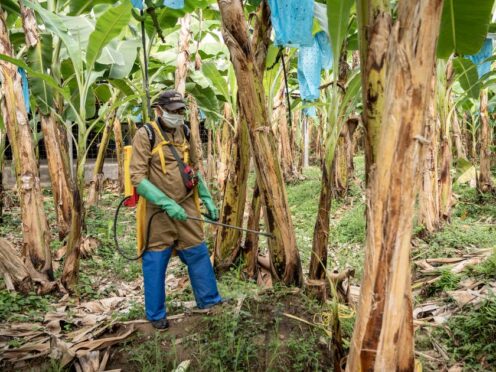Banana farmers across the world need urgent support as climate change and soaring costs threaten their ability to stay in business, a senior leader at the Fairtrade Foundation has warned.
Anna Pierides, the organisation’s responsible business senior manager for bananas, called on the UK banana industry to lead the way in driving change towards more sustainable supply chains.
Speaking at the World Banana Forum in Rome, Italy, on Tuesday, Ms Pierides said the consequences of climate change on production in the sector are “very real”.
She said: “Farmers are battling daily with unpredictable weather patterns, scorching sun, floods, hurricanes and increased cases of plant diseases. All these are hitting producers hard.
“Meanwhile, soaring production costs including fertiliser, pallets, plastic packaging, labour and more are adding extra pressure to already fragile livelihoods.”
Ms Pierides warned that if farmers around the world are not paid fair prices, they will be unable to cover their costs and stay in business.
The forum, organised by the Food and Agriculture Organisation of the United Nations (FAO), sees retailers, importers, producers, exporters, consumer associations, governments, trade unions and civil society organisations gather to discuss the various problems facing the global banana sector.
Ms Pierides told the event that urgent action is needed to support banana producers who are facing unprecedented pressures this year.
“Without fair prices, banana farmers simply cannot make ends meet,” she said.
“If banana producers are unable to cover their costs, they are unable to stay in business.
Fairtrade has been urging the UK – which is among those with the highest per capita consumption of bananas in Europe and imports, on average, more than a million tonnes a year – to drive change within the sector at scale to ensure brighter futures for farmers and workers.
“Our legacy of low supermarket prices only serve to devalue bananas, and they are not sustainable,” Ms Pierides said.
“With rising costs for banana farmers and other players along the supply chain, we cannot continue to be content with a situation where banana farmers pay the price for our low-cost fruit.”
Fairtrade’s minimum price guarantee on bananas means producers are given a safety net against volatile market conditions, ensuring they are paid a price that covers their average cost of production.
Ms Pierides called it a “critical foundation from which to address risk, and to ensure sustainable supply of bananas in the future”.
She also told the forum the price guarantee, as well as Fairtrade’s living wage reference price helps to support efforts to close wage and income gaps for producers.
“Fairtrade standards are designed to improve employment conditions and protect the rights of workers on certified plantations and to support certified farmers to increase their incomes and gain more control within the banana supply chains,” she added.
“Fairtrade is working closely with plantations and small holder organisations to focus on farm practices and a diversified crop base to mitigate climate risks, improve income opportunities, biodiversity and soil health.”
